Grand Opera House Program, December 12, 1912
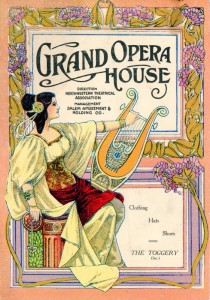
Theater Program, WHC 63.1.21.10.3.1
I find one of the more revealing types of historical items we collect at the Willamette Heritage Center is usually classified as ephemera. These little bits of disposal paper from bygone events– concert programs, ticket stubs, product brochures – were probably considered trash by their original owners. When given a chance to age they often become poignant reminders of our past. I came across one such jewel this week, a printed program from the Grand Theatre when it was still the Grand Opera House dated December 12, 1912. This humble, creased and stained paper touches on several aspects of our history, including the disturbing and the humorous.
Leading man and producer for the performance that Thursday night 105 years ago was Walker Whiteside. He had gained fame nationally as a teen actor tackling the mature roles of Hamlet, Othello and King Lear on very big stages. The material Salemites saw that night was not his classical repertoire, but the adaptation of work by a Hungarian playwright titled “The Typhoon.” Set in Berlin, the play featured a Japanese hero (played by the decidedly not Japanese Whiteside) seducing a German woman, murdering her and allowing another to take the blame because of his (the hero’s) importance to national interests. The plot sounds fairly modern, but it takes on a more sinister light when considered in context of the times and vitriolic language used in many reviews. One review published in the Hampton’s Magazine makes no bones about where the play stands. The opening line explaining the plays title reads: “The typhoon is that overwhelming yellow storm of Japanese which some day is going to send every other race down to Davy Jones.”[1]
Anti-Japanese sentiment ran high throughout United States during this time. Salem was no exception. Just a few years before this play was seen, candidate for U.S. Senate Harry M. Cake ran on a platform declaring “I am opposed to the admission of Chinese and Japanese … labor in competition with our intelligent and independent workingmen. America for Americans.”[2] An advertisement for Salem’s Hotel Argo in the play’s own program reads: “European Your Patronage Solicited.” At first, I thought I must have misread this statement, but a quick search of other advertisements for the hotel which once stood where the Chemeketa Parkade now does downtown, confirmed my initial reading. “Our chefs, kitchen help and waitresses are all AMERCIAN women” another advertisement reads.[3]
The advertisements throughout the program provide glimpses of what life in Salem was like a century ago. At Davis Barber Shop you could get your shoes shined, a cigar and a bath, reminding us that not everybody had indoor plumbing. The back page of the program touts electricity and gas as “modern necessities” giving a two digit phone number for people to learn more. Products advertised as good Christmas gifts include ladies silk waists, fancy neckwear, silk hose, corsets, phonographs, records and sewing machines. Hungry theater goers were reminded they could get oyster cocktails and hot drinks after the show at Belle’s. The Wexford theater offered motion pictures daily and live Vaudeville on Sunday and Thursdays, catering to the old and new forms of entertainment. The Salem Steam Laundry offered pick-up and delivery service, with the caveat that “our service is as certain as it can be made.”
Not to be overlooked, the very first page contains the somewhat comical “Rules of the House.” Amidst the predicable no smoking, no intoxicating liquors, and no children under three years of age are some wacky rules. Physicians were required to register at the box office and give their seat number to the attendants so that ushers could find them in case of emergency “without disturbing the audience.” Remember this was the time before 911 and community doctors played the role first responders most often. Forget TicketMaster, the box office opened at 9 am on the day before the attraction. Telephone orders for tickets could be taken, but only after the office opened and employees were present as there were no answering machines.
Quite ingeniously there were standard times for all shows at the theater. The curtain rose at 8:30 pm for regular shows and 2:15 pm for matinees. For those looking to plan ahead, the program suggests they order their carriages home for 10:25 pm. Conveniently there was a “Ladies’ toilet room at the south end of the foyer.” One wonders a bit about men’s rooms and if toilet really meant toilet in the sense we use it modernly or just a place of refreshment and privacy with standard privies out back. Just in case you were wondering what the most important rule was, the managers have conveniently set one in bold type: “Eating peanuts not allowed in the theatre.”
The final provision listed was an entreaty. In an interesting take on customer service, the theatre asked that patrons “please report at the box office any inattention or incivility of ushers or any other employee of this theatre. The management will consider this a favor, as the principle of the house is to please, not to offend.”
Early Timeline of the Grand Opera House Operations
Unless otherwise indicated, this information was taken from extant City Directories in the Willamette Heritage Center’s collections.
| 1900 | Grand Opera House opens[1] |
| 1905 | Frank Meredith, Manager |
| 1909 | Ray L. Farmer, Manager |
| 1913 | Salem Amusement Holding Co., proprietors |
| 1915 | Ditto |
| 1917 | T.G. Bligh, Manager |
| 1921 | Name appears as Grand Theatre
A.E. Laflar, Manager |
| 1924 | A.V. Hile, Manager |
It is interesting to note, that even though the name was changed to Grand Theatre sometime after 1917, businesses like the opera house pharmacy appear to have retained their name beyond the change. See photograph below:
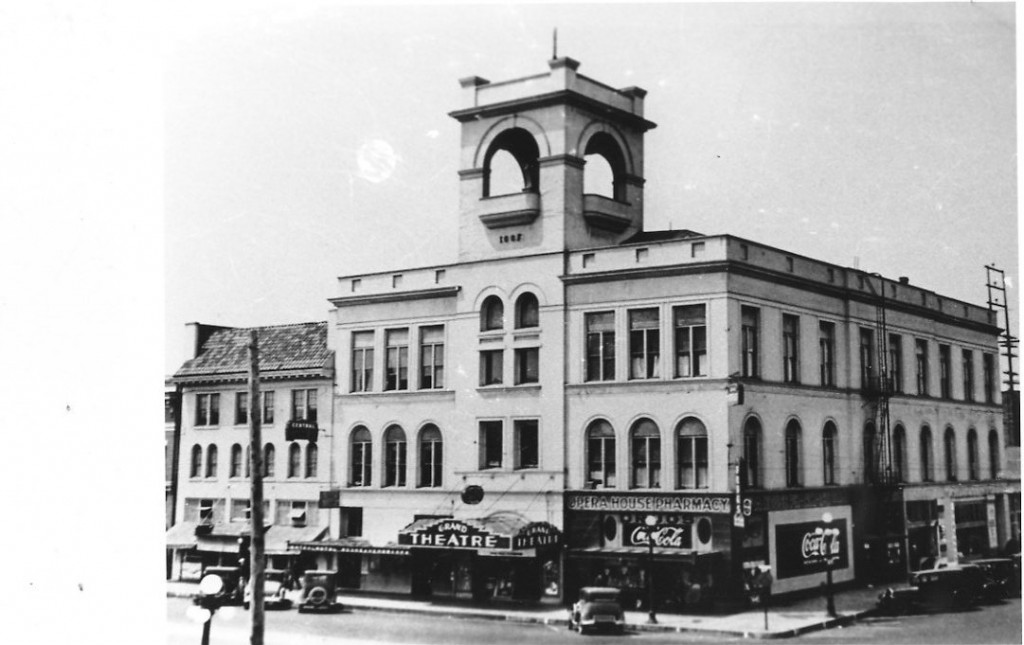
Salem’s Grand Theatre, circa 1920. WHC 2007.001.1702
[1] The exact date of the opening is a little obscure. Articles in the Capital Journal and the Oregon Statesman dated September 28, 1900 “predict a rousing opening of the Grand Opera House, the event ought to be one worthy of the new place of amuseument.” However, an article entitled “Salem’s Grand New Theatre” published in the Capital Journal 22 November 1900 indicates that it would be “opened with Two Nights of Grau Opera.”
Citations
[1] “The Typhoon” Hampton Magazine,1912 volume 28, page 296. Available through GoogleBooks.
[2] “Platform of H.M. Cake” WHC 1988.076.0020
[3] Hotel Argo Dining Room Brochure. WHC 0083.043.0012.016
The first part of this article was written for the Statesman Journal and published December 3, 2017. It is reproduced here with citations and additional context information.



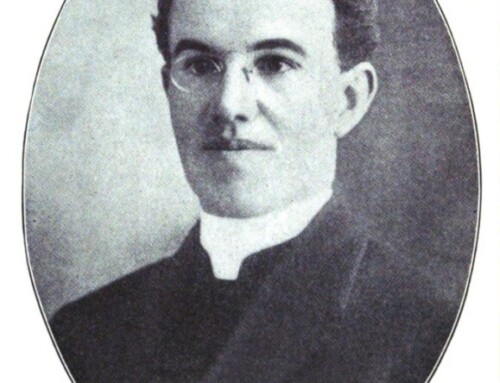
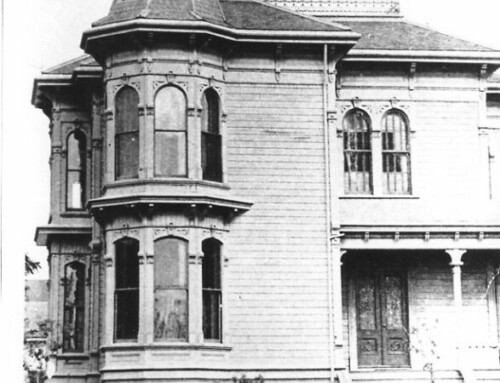
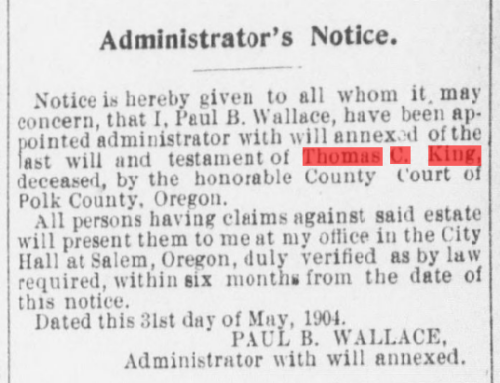
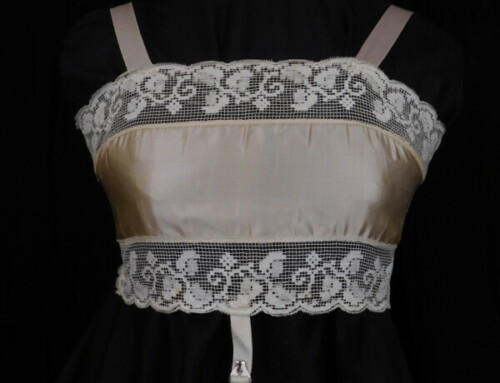
Leave A Comment